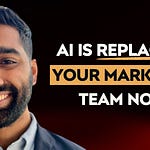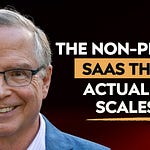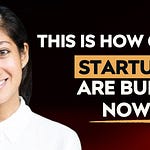In today’s fast-moving startup world, it’s tempting to chase trends, slap an “AI-first” label on a pitch deck, and hope for inflated valuations. But according to Ari Newman, co-founder and managing director of Massive VC, true venture success comes from patience, discipline, and spotting inflection points where companies shift from potential to proven traction.
Ari is no stranger to the founder’s grind. Before launching Massive VC, he built and sold two startups—FilterBox and Juston—and helped scale the Techstars platform, mentoring and investing in hundreds of founders along the way. Now, he and his team at Massive back companies across AI, data, energy, cybersecurity, space, and more, looking for signals that a business is ready to accelerate.
Playing the Long Game at AI Speed
Venture has always been a marathon, not a sprint. Traditional funds operate on 10-year cycles, sticking with the same thesis across multiple fund vintages. But in today’s world, where new technologies like AI can reshape industries overnight, rigid strategies don’t cut it.
Still, Ari cautions against trend-chasing. The blockchain and Web3 boom showed how quickly hype cycles can shift, leaving investors holding companies with no real utility. For him, AI is no different—it’s a powerful tool, not a standalone thesis. The winners will be businesses that integrate AI to solve real problems, not those that use it as window dressing.
From Founder Pain to Investor Empathy
Ari’s shift from founder to VC was born out of frustration. Early in his career, he saw firsthand how opaque the venture process was—investors asked for everything, while giving founders little information in return. That asymmetry sparked his desire to become the kind of investor he wished he had: transparent, empathetic, and aligned with founders.
At Massive, he insists on an “equal effort” rule: if a founder has done the work to understand the firm’s focus and makes a thoughtful pitch, he’ll respond. But if someone blindly spams him with irrelevant ideas, they won’t hear back. Time, he explains, is the most limited resource for both sides.
Inflection Point Investing
Rather than chasing ideas at the napkin stage, Massive VC invests when companies hit critical inflection points—moments when traction, customer demand, or market timing shift the risk-reward balance. For software companies, this often means a repeatable sales motion, revenue endurance, and evidence of product stickiness. For deep tech, it may mean moving from lab curiosity to real customer orders with deposits attached.
Ari and his team call this strategy “seed plus”—coming in after the friends-and-family hustle but before traditional growth capital. Their aim is to lower loss ratios while still backing companies capable of breakout success.
Hard Lessons in Pricing, Dilution, and Efficiency
Ari candidly shares some of the mistakes he made as a founder—like underpricing FilterBox to make it easy to adopt, which unintentionally signaled low value to customers and created an unsustainable sales model. He also warns founders about the dangers of stacking SAFEs, which can create painful dilution surprises when later rounds convert. His advice? Mix priced rounds with convertible instruments to avoid cap table disasters.
Capital efficiency is another theme he stresses. In an era when startups sometimes raise $8 million just to reach $1 million in ARR, Ari sees red flags. The best founders, he argues, always manage their options—knowing when to prioritize growth, when to cut burn, and how to control their destiny.
What Breakout Companies Really Look Like
In the end, Ari emphasizes that great companies aren’t just built on technology—they’re built on timing, fit, and resilience. Slack wasn’t the first chat tool, but it integrated so deeply into workflows that it became indispensable. Vertical AI startups won’t all reach trillion-dollar outcomes, but many will build highly profitable, billion-dollar businesses by solving industry-specific pain points.
Above all, Ari reminds founders that venture capital is not a prerequisite for building a great company. The only reason to take outside investment is if you can’t bootstrap or if you need expertise at the table that you don’t yet have. And when you do take capital, it’s about fit—finding investors who will be true partners for the long game.
👂🎧 Watch, listen, and follow on your favorite platform: https://tr.ee/S2ayrbx_fL
🙏 Join the conversation on your favorite social network: https://linktr.ee/theignitepodcast
Chapters:
00:01 Welcome and introduction to Ari Newman and Massive VC
01:00 Playing the long game in venture at AI speed
04:00 Hype cycles, narrow theses, and avoiding trend chasing
07:30 Blockchain and Web3 as case studies in misplaced hype
08:20 Ari’s journey from founder pain to becoming an investor
11:30 Handling founder meetings, cold inbounds, and the “equal effort” rule
14:30 Transparency, fit, and why fast no’s matter more than slow maybes
16:20 Running startups vs. running a venture fund — stress, control, and feedback loops
18:40 Lessons from Juston and FilterBox on timing markets and exits
25:00 Slack, product defensibility, and embedding into workflows
27:30 Opportunities in vertical AI SaaS and sticky use cases
29:00 Inflection point investing and Massive VC’s criteria
31:30 SaaS pricing mistakes, customer commitment, and enterprise sales models
35:30 Techstars lessons carried over into Massive VC
38:20 Building Massive with SPVs and the “Massive Index”
41:30 Practical diligence at inflection points: revenue, retention, and distribution signals
44:30 Transitioning from software investing to deep tech markets
47:30 Leading indicators, financial hygiene, and operational discipline
49:00 SAFE stacking risks, dilution traps, and cap table complexity
56:00 Capital efficiency, market cycles, and the broken contract between founders and investors
Transcript
Brian Bell (00:01:06): Hey, everyone. Welcome back to the Ignite podcast. Today, we're thrilled to have Ari Neumann, co-founder and managing director of Massive VC, an inflection point VC platform backing high growth technology companies across AI, data, energy, cybersecurity, energy transformation, and the new space economy. That's pretty cool. He's a repeat founder. He built and sold Filterbox and just on help scale, the Techstars investing platform now sits on or advises multiple growth stage boards. He's been fundraising both sides of the table, has strong opinions about communication investor relationships, safe stacks, and what really signals a breakout inflection. Buckle up, everyone. Thanks for coming on, Ari.
Ari Newman (00:01:42): Pleasure to be here. Thanks for having me.
Brian Bell (00:01:43): So you said investing is about playing the long game. How does that work in a world now moving at AI speed? What's breaking out?
Ari Newman (00:01:50): Yeah I mean things are obviously changing quickly and historically you know venture funds are like 10 year cycles or longer and you sort of set your strategy prior to raising your fund you raise your fund you deploy the capital you kind of stick to your knitting you want to raise fund two you need to do largely what you were doing in fund one and so on and so forth if you are successful enough to have a bunch of home runs you get more latitude to play around and i think what's happening now is that, you know, the world's moving quickly. Money flows where, you know, where companies are getting traction is changing and VCs can't just reinvent themselves and change strategy every other week. And nor should they, like you can't keep chasing hype, but at the same time, having something that's a 10 year rigid strategy doesn't really work anymore either.
Brian Bell (00:02:35): That's really interesting. It's something I struggled with as a VC. What's your thesis? I'm on Fund 3 now, and I kind of have these two parallel thesi. One is like kind of, hey, YC, investing in a bunch of YC companies. The other one's, you know, a bunch of B2B software AI companies. And I really struggled with this when I raised Fund 2 because I was like, oh, I could have called it an AI fund right at the, like, I was like 2022. Like, could have called it an AI fund. When I stepped back and I looked at it, I was like, I don't think I want to have just an AI only fund, right? Because I don't think it's a broad enough thesis to generate alpha. And yeah, sign of the times, everybody's using AI. But it's like saying, I have an internet fund in the 90s or I have a database fund in the 80s. And you're just kind of like trend catching. And then like what happens on the next one, like you said. Yeah. Where, okay, now AI is not the, you know, the dish du jour. And I have an AI fund and I need to raise another AI fund and nobody cares.
Ari Newman (00:03:28): We've seen this pattern repeat itself over and over and over again. And there's sort of two things that come up for me. Like thing one is this is exactly why my partner David and I didn't start a fairly narrow fund one. Exactly what you said. We didn't want to pick a lane and live in it for 20 years. We weren't sure. We just knew we wanted to start investing together. and that we had deal flow and that we wanted to figure out how to solve some of the problems that we experienced as operators and LPs vis-a-vis venture. And so we didn't go out and raise a traditional fund when we started investing our own capital and inviting other successfully exited founders to co-invest with us using SPVs. And we started iterating. I always like to pick on the The blockchain and crypto era, if you were running like a mediocre B2B company and or a mediocre B2B SaaS fund and the blockchain and like Web3 showed up, everyone sort of pivoted and said, we're now investing in Web3. And it was totally like hopping on a trend. People also tried to go then issue tokens and think that their business is worth 10x what it actually was. And then halfway through those Web3 deployment cycles for the Web3 fund, they were like, just kidding. We're sending out an email to the LPs. We're now an AI fund, right? And the entire AI ecosystem is amazing, but it's also a multi-billion or trillion dollar subsidy that is coming from giant pools of capital.
Brian Bell (00:04:49): I see so many great companies right now that are, you know, they use a little bit of AI, but they're not like AI native or AI first or anywhere in the stack. AI, if anything, they're kind of like a weak wrapper with SaaS. But I see so much alpha out there outside of AI, you know, like traditional marketplace businesses or just vertical SaaS businesses. They're growing at a very solid, you know, 20, 30% a month. And they're just quietly raising, you know, 10x multiples, not 100x multiples like AI companies. And they're just really good business. I know, are you seeing kind of the same thing in your thesis? Maybe you guys can talk about a little bit about your origin story and yeah.
Ari Newman (00:05:26): I have a similar philosophy. I think that it's a super exciting time, but if cursor can go from zero to a hundred million overnight, then the next cursor can too. So how much is that revenue worth over the longterm? And then where's the differentiation come from? So I think there's lots of places to generate returns and have a great run as both an investor and a builder. And eventually- AI is just an evolved tool set. Like machine learning has been around for a long time. We were using, we were, we were doing natural language processing at filter box in 07. And eventually LLMs and all these APIs that we have now and agentic stuff, like people will just use them to smarter, faster tools. And it's not going to be so much AI for AI sake, just like web three, like moving your database to the blockchain didn't change whether your product had utility or not.
Brian Bell (00:06:14): That was always my problem with blockchain because that was right about the time I was starting to invest, you know, my own money, 2018, 2019, starting to write angel checks, LP and some funds and stuff. And before I started Team Ignite as a syndicate, because I kind of took a similar path as you and syndicated stuff for the first couple of years. And I remember just like always looking at these businesses and I'm like, why does this have to exist this way? I just could not come up with the why on the blockchain and Web3. I was like, okay, so it's decentralized and better and on-chain or whatever. Why? Why does it have to exist this way? You know, because, you know, somebody's distributed ledger on sharded out on AWS works just as well if you trust them. Like I just could never like that was always like the it's like the was it South Park, you know, where the gnomes steal the socks and it's like question mark profit in the middle. It's like, OK, blockchain question mark profit. What's in the question mark?
Ari Newman (00:07:07): Every now and then you see a company that is properly applying the technology to either drive margin, take friction away, or in the case of blockchain, solve a security problem. We're investors in a UK-based company called Signatize. They're using the blockchain as an immutable ledger for signatory management for large enterprise. The fact that somebody could go and edit a database and actually change what was supposed to be history when it comes to a lawsuit over who could sign a contract or not makes sense. That seems like we got excited about that because it was an appropriate application of the technology, right? If you think about some of the stuff going on with AI now, if you can get to the answers faster, if you can hold more analytical data and historical transaction data in the virtual brain at once versus the old way of hard coding the logic, that makes sense. But the rest of it is just noise.
Brian Bell (00:07:59): Yeah. Let's let's go back to the beginning a little bit, because we could sit here and just riff on, you know, VC stories, but I, you spent over a decade building companies before crossing into this crazy side that we find ourselves in. What moment or pain as a founder most pushed you into the dark side of the startup ecosystem, first at Techstars and then later into massive?
Ari Newman (00:08:19): It's funny. I used that term the other day and it came out of my mouth. I'm like, this does not land for me anymore.
Brian Bell (00:08:26): I'm poking fun at us.
Ari Newman (00:08:28): I think it's funny too. I think it actually, it's a great tee up because I actually think that that speaks to some of the pain. When I was a founder the first time, I was not the CEO. I was literally 18 months out of college. The CEO of the company raised money from a couple of investors. I wasn't even involved. It was during the dot-com era. So I didn't get a lot of visibility until we were further along and we got towards the sale transaction. I really started to understand more of the mechanics of cap table management, investor liquidity, and things like that. When I started Filterbox and I was really out pitching for both the seed and the series A round is where I really started to understand this sort of asymmetry and the opacity that venture, especially back then had. You go in and you pitch an investor, they tell you almost nothing. Now we have endless volumes of books and podcasts and info on what questions to ask, how venture works, right? I mean, Brad Feld and the Foundry guys have written an entire library of how to be smarter than your lawyer and unpacking everything. We didn't have that transparency back then. And the investors loved the information asymmetry that they had. Tell me everything about you and your company. Give me all your data. And I'll give you limited information. I thought that was difficult. Like I had no choice as a founder, but I also was naive. Send me your data room. And I didn't know what questions to ask and I didn't have anyone walk me through. Here's how this works. Here's how funds work. Here's how partnerships work. And by the way, all the rules are different in every single shop.
Brian Bell (00:10:00): That's what I love about investing in YC companies, actually, is they're so well coached and trained. It's almost like they are on equal footing with me because they're so well coached. And they know how to get to the point in 10 to 15 minutes. And I can usually make an investment decision by minute 15 or 20 of that meeting. I get on with other founders who are all over the place. They want to talk, talk, talk, talk, talk about... you know, me and Team Ignite and give their whole life story. And it's like, man, we're like 10, 15 minutes in this and I don't know nothing about the business. I know nothing about why you're doing this, like what problem you're solving, what friction you're removing, what your traction is. And by minute 15 with the YC founder, it's like, I know exactly what you stand for, where you're at with this business and whether or not I want to invest.
00:10:44 – 00:20:00
Ari Newman (00:10:44): Right. So that's interesting. The consistency of how they deliver their narrative allows you to focus on the exceptional pieces. The rest is like the baseline.
Brian Bell (00:10:53): Yeah. I find, I find like, I'm struggling to get through it with a lot of founders. Like today I had a bunch of founder meetings and I, I'm a little bit too generous with my time, you know, which is kind of funny, like as a VC, right? Cause I could see the, I don't know how many years into this are you?
Ari Newman (00:11:07): I'm five years now into massive.
Brian Bell (00:11:10): Yeah, you're about the same. So I'm five years into Team Ignite and Fund 3. And I can see myself becoming this cantankerous asshole of a VC over time. I don't know if you've experienced this as well. I'm almost losing myself in the role as a VC. And I'm trying to be nice and generous. The demands on my time get exponentially harder to manage. I don't know how you're experiencing that or managing that.
Ari Newman (00:11:34): Yeah, I mean, I think that's a constant tug. You want to be a good steward. You want to be helpful to the community. You want to engage with everybody you can, but we have to be ruthless prioritizers in order to spend the time on the stuff that matters. Exactly. And it's not because your idea isn't interesting or you're not an interesting founder, but there's a good reason for it, right?
Brian Bell (00:11:58): I just made a tweet about this where it's like, hey, no offense, but we're getting 50 inbounds a day and you're inbound number 37. And you came in cold. And so fuck off. Sorry. It's not that I don't want to be an asshole, but like... I have to pay attention to my portfolio companies. I have to pay attention to all the warm intros. And your 37th cold inbound that day is just like, I don't know, just go away.
Ari Newman (00:12:25): Here's my rule. If you haven't done any work and I was in some database, you don't get a response. Equal effort. If you have put some work in, you look at under my, stand in my portfolio, you have written even one paragraph or even had AI write the paragraph on why you think your company is a fit for our strategy, I will take the time to respond. Do a little work. I will also do a little work, but I don't mind cold inbounds, but I'm raising pre-seed for a education marketplace. Like clearly you did zero work and so you get zero response.
Brian Bell (00:12:58): Yeah. Hey, we're, we're a series B medical device and phase two trials. Like clearly like, what, what are you talking about? Like, that's just not what we invest in.
Ari Newman (00:13:06): You found my domain. It's on my website. Like, please. Right. I guess. Yeah. Brian at re at, you know, like, right. So, you know, to look, to answer the question, like after a decade of building companies and trying to raise money in difficult cycles, you know, I really wished for more transparency and more education. And when I was working at Techstars and I got to, you know, mentor, I was a Techstars founder myself in the first class and I got great mentorship and then I got to support and help. coached tons and tons of other companies i got to invest in tons of tech stars companies like my thing was always breaking down the game for the founders to help them get to yes or no faster every no frees up your time same thing goes for pitching lps as a gp right and we have the same thing going on in the gplp market where some people are trying to unpack it which is amazing and other people continue to try to gatekeep
Brian Bell (00:13:58): Yeah, that's a fascinating discussion because we're doing the same thing that founders are doing, right? We're out there fundraising just like them. And so, I don't know, game recognize game. When you see a good founder who's good at fundraising, you're like, okay, I recognize you're good at this because I'm on the other side doing the same thing with LPs.
Ari Newman (00:14:17): The one thing I wish I really understood back then that I get now It does sound like a little Pollyanna-ish or pie in the sky or whatever, but it really is about fit. That first-time founder mindset of, I'm working really hard on what I think is a big idea and therefore maybe I'm even entitled to getting checks from some investors. When I, when I, when I, when I sense that chip on the shoulder with founders, I talk to, I can, I can see it because I think that was me when I was raising money in the past. And I was like, why don't I have a vision? Why can't you see it? I know what I'm doing, or I think I do, you know, why won't you join me? And it's really just about fit. And the worst, the worst outcome is someone who doesn't spend enough time to like drive, you know, like find that alignment. actually writes you a check and then regrets it and becomes a huge pain in the ass. It's much better to get a quick no from someone who's either not willing to do the work or just isn't a fit because things change. Businesses are hard. You want someone that you can have rapport with. And as we get into the rest of this conversation, I think that's a theme that'll keep coming back is the only reason to have investors is if you can't bootstrap the business or you need other experts around the table because you don't have all the answers.
Brian Bell (00:15:27): So I want to unpack something really quick because of your experience. I mean, both as a founder raising money and running a venture fund, what was, what's been harder running a startup or running a venture fund? I'm talking about the day-to-day operations.
Ari Newman (00:15:38): It's a hard question for me to answer because it's just different. And I think the way we started massive, which was not a traditional fund and running SPVs and syndicating and raising money deal by deal. Like we've also been iterating quickly. So I feel like I'm running a startup. And I also feel like there's a lot more operational overhead than we probably deal with than your standard 20 million fund one solo GP, third party back office. I would say the day-to-day stress of being a founder, like under the gun of, you know, limited runway pressure on metrics in that compressed timeframe is way more intense. The hard part about the transition for me, especially when I started investing at Techstars was going from like instant feedback loops. When you're the CEO and you're running a small team, you look at some market data, you talk to customers, you make a decision, you execute, you implement, you get feedback. And the feedback loops are tight. Even though you're running out of money and have limited runway and have a board of directors to answer to and employees to live up to and support, the iteration speeds really fast. And I just inherently feel like I'm in control. I could be spinning, spiraling down to hell, but I would still feel like I had both hands on the wheel. And being an investor with like a five to 10 year feedback loop was a huge shift. So I just think it's just different. There's something to be said for being in control. There's also something said for the pressure and responsibility that comes with day-to-day execution in that realm.
Brian Bell (00:17:07): So, you know, Filterbox to Jive, just on a novelle, two exits, two different eras. What did each teach you about timing markets and buyers? And how does, you know, those experiences inform how you coach founders today?
Ari Newman (00:17:19): Yeah, going all the way back to the .com era with JustOn. You know, interestingly, in both cases, I would say that we were too early. With JustOn, I mean, we built basically Dropbox file sharing service in 1999, went from concept to 5 million monthly uniques in like six months. We were told by some people back then that the internet wasn't going to be a thing. And when the .com crash started to happen, they were like, see, I told you so. The other issue was the cost of storage and bandwidth. We were solving a huge problem, which was making files readily shareable online. We replicated the Windows Explorer file tree. So anyone that knew how to use a computer in the late 90s understood what we were doing. And yet when you looked at the economics, it wasn't until, you know, 05, 06, (00:18:10): 07 in online file sharing business economics could really start to work. And so even though we were solving a pinpoint, the size of the market and sort of both the cost So we had both the customer and the investor community weren't sure if it was going to be...
Brian Bell (00:18:22): Getting to 5 million in six months tells me either you had some sort of growth hack or there was actually a product market fit. Maybe you weren't too early. There was demand there. But was it just that you just couldn't... There wasn't enough margin in the business because the cost of ingress, egress, and data transfer and data storage was just... too high pre-AWS, pre-cloud?
Ari Newman (00:18:43): There were like three things happening simultaneously. One was a growth hack. So we came up with a way to enable somebody to upload a file, click a button and get a URL, like one-click publishing in 1999. That immediately allowed people to share content in a way that they had never done before with the internet.
Brian Bell (00:18:59): Could have swore I used JustOn in my MySpace account back in the day. Yeah. I mean,
Ari Newman (00:19:05): the reason it was called Just On is our vision was to be a utility for the internet, to build like micro apps and embed them in other portals. So we had that going on and we had tons and tons of demand and tons of traffic. At the same time, like that was the day, those were the days where we were literally buying hardware from VARs, racking and stacking, installing, operating. I was going over to network appliance every single week and buying a new filer shelf and putting it into the rack in order to meet storage demands. We were creating the cloud. There was no cloud. And the cost of the infrastructure to fund an experiment to see if this kind of technology was popular was interesting. But we were also growing so fast that we didn't have time to go play the game with VCs. And while we were hyperscaling, at least for us back then, Then the folks at Novell got interested in what we were doing. And even before they'd acquired us, they started sending over more hardware and more resources and fiber backbone routers so that we could meet traffic demands. And I had all these vendors that were trying to scale the internet, helping us scale our platform. And all of this was happening so fast that we sort of realized if we're going to make this work, we really want to be part of a bigger, highly resourced platform. and constantly raising money and selling chunks of the company for hardware at this speed that we needed to deploy it back then just didn't make sense. At the same time, we had come up with this reverse proxy technology that Novell had that we put in front of the website, made it fast, There was another opportunity there. And so it just sort of made sense for us to join forces with them. So we started that and sold it in a year. And in hindsight, maybe we were too early. The unit economics weren't going to be viable as an independent company that early in the evolution.
Brian Bell (00:20:48): So there was demand. It was something people needed, but you just couldn't scale it profitably. It was like, you're just going to burn a bunch of easy cash.
Ari Newman (00:20:55): And we actually didn't raise much money. We never went down the like series A, series B route. We exited before that. And if you look at the internet today, like people sharing, storing, and collaborating on content online is kind of like one of the core internet use cases. I heard that a lot. And sure enough. What year was this? This was 07, 08, 09. Wow.And how many,
Brian Bell (00:21:40) how many unicorn social media companies and related companies were founded in that era?Right. Like five year post iPhone era.
Ari Newman (00:20:55): And that actually is why today when I talk to founders and look at companies,it's not whether you can build the technology. It's about whether you've got the right, you know, formula of, is it the right product at the right time when there's enough market demand?
Brian Bell (00:22:02): There's enough tailwind in the market. So like, you'll look at a startup and you'll be like, I don't care if you're six or seven to the market, if there's something unique about the team and the traction and the technology, just like kind of Google was the 17th search engine, right? In the late 90s. And so like, if you're an investor looking at that, you're like, well, yeah, amazing demo, really smart kids from Stanford. But I'm already in like two other search engines in my fund. So maybe I won't invest. And that would have been like detrimental to your whole career. That's right. How do you think about that as a VC?
Ari Newman (00:22:34): I mean, it's hard, right? The lessons I learned from all of that is that it's not always about the technology unless you have fundamentally solved some piece of either friction, user experience or product friction or distribution or in a way that others hadn't. I always use Slack as the example. They were what, the 45th chat app, essentially. It's not like we didn't have other...
Brian Bell (00:22:58): Yeah, you had HipChat before that and a bunch of other...
Ari Newman (00:23:00): Tons of them, all the way back to Yahoo chat. Business-to-business chat was not new. But what Slack solved that they still sort of own today was the ability for teams to really deeply collaborate. They were smart to build APIs and integrations into the dev environment, GitHub posts. They embedded themselves into the business workflow better than the standalone chat tools did. And once you get embedded and it becomes part of your workflow, then why tear it out?
Brian Bell (00:23:30): That's the magic of B2B software, right? It becomes this like the standard in which you do the business. Now I need this thing to do the business that I do and I can't rip it out. I could replace it. Maybe, you know, you really got to be unhappy to rip something out and replace it.
Ari Newman (00:23:43): Well, I think enterprise software companies now need to be on notice that if they can't maintain moat and deep integration, that some vibe coding weekend crew is going to basically replicate the functionality and offer it to you for a fraction of the price because the team is eight people, not 800.
Brian Bell (00:24:01): Well, this is why I'm kind of, I'd love to get your thoughts on this, but I'm sort of bullish now on vertical AI-powered SaaS because you're seeing these companies come in and really disrupt these new startups coming in and disrupting this kind of first-gen, really ugly SaaS, completely underserving that industry. And now they can come in and just kind of build out a fully functioning set of everything that that vertical could possibly need and just fit the product so well to that use case that it's so sticky and perfect.
Ari Newman (00:24:31): I mean, we're particularly interested in vertical AI companies for that reason and I think that's where a lot of money is going to be made.
Ari Newman (00:24:31): I mean we're particularly interested in vertical ai companies for that reason and i think that's where a lot of a lot of money is going to be made yeah you're not










